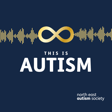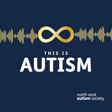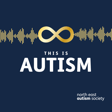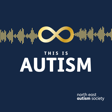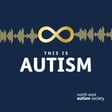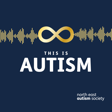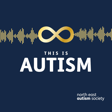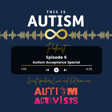Become a Creator today!Start creating today - Share your story with the world!
Start for free
00:00:00
00:00:01

8. Transition from School to Adulthood as an AuDHD Person
In this episode Kerrie Highcock, family development manager at NEAS chats to Amy Burgess, who was diagnosed with ADHD at 15 and as autistic at the age of 20. Amy is a psychology graduate who is passionate about sharing her experiences with others about what it is to be neurodivergent.
Amy says she didn’t really understand who she was or how she experienced life until she lived away from home at university. This episode talks about transition from school to adulthood.
Transcript
Introduction to Amy Burgess and Her Journey
00:00:05
Speaker
So for a lot of my high school, I was putting in twice as much effort to be able to get the grades that I'd been getting. But all people saw in school was me not paying attention and sitting there doodling or lesson. In terms of supporting people through that transition is to have a safe space. I think that is the most important part of all of it. But it's to do with the three S's. So a lot of your uncertainty comes from structure, social or sensory.
00:00:34
Speaker
Hello and welcome to This is Autism, the podcast from the North East Autism Society. My name is Kerry Highcock and I'm the Family Development Manager at the charity. I'm really pleased today to be chatting to Amy Bergus, who was diagnosed with ADHD at 15 and was autistic at the age of 20. Amy is now a qualified psychologist who is passionate about sharing her experiences with others about what it is to be neurodivergent. Amy says she didn't really understand who she was or how she experienced life until she lived away from home at university.
Transition Challenges and Neurodivergence
00:01:02
Speaker
So what we're going to be talking about today is a transition from school to adulthood and what a really big deal that can be. So welcome Amy, lovely to have you here. Thanks for having me. Can you tell us just a little bit about yourself Amy please?
00:01:16
Speaker
Of course, so I am autistic and ADHD and I am the owner of AJ's Brain, where I essentially go around to schools and businesses and the and NHS and to parents and just talk a bit about kind of what it's like in my brain and how I experience the world and how that impacts things. um I am a qualified psychologist, so I have that kind of the knowledge, the theoretical background as well as the lived experience. And I also work as a teaching assistant two days a week at the moment. So I kind of work with neurodivergent children and have that experience as well.
00:01:49
Speaker
and In terms of having my diagnoses, I found the transition into adulthood really hard and I've kind of had to figure a lot out about myself as I've been transitioning into that adulthood and looking back at my life and all the different and ways I experienced things growing up and all these different experiences and putting context to that with my diagnoses has been really, really helpful, which is part of what my age age brain allows me to do is figure things out through AJ's brain and talking to people and then putting that into my life and further kind of figuring myself out.
Impact of ADHD and Autism on Life Choices
00:02:25
Speaker
And I've seen AJ's brain and and it's it's wonderful the work that you do is really really incredible. I love some of the illustrations and but you must be super busy Amy that sounds like you cram a lot into your days. Absolutely I am yeah it comes with a lot of support and I've got a really good support team around me that are really helpful and allow me to kind of
00:02:46
Speaker
do the work that I do while not having to spend all my time on the organising. I've got people who can help me figure out when I'm doing things and what I'm doing, so it does come with support. Wonderful. So you're autistic and you also have ADHD. and Can you tell us a little bit about what does that mean for you, Amy? What does it mean to you as well? ah so To be honest, it's at the heart of everything I do. It's at the core of everything I experience and I think and the way I go about the world, it's completely at the heart of all that. When I think about it in terms of obviously being diagnosed relatively recently with both ah looking and looking back at my life, I can see it was the ADHD part of me that was more impactful as a child when I look back. So as a kid, I was very on the go, very excitable, bouncy and bubbly. And like I would agree to all clubs and activities. I had very little sense of danger and stopping and all of that. I was constantly just doing things.
00:03:41
Speaker
and And people would say, like, do you want to? And I'd say yes, before I even really knew what it was. And that was at the heart of a lot of things. so But I think that developed me at that age, a bit of a persona of like outgoing and bubbly and excitable and social, which then when I got older in the world, kind of got more like serious and there was a lot more responsibilities on things. I started to find the world just a bit scarier and there was a lot more independence and organizing my own things. And that's when kind of a bit of a switch happened and I realized there's probably more going on in my life. That's not like, obviously the ADHD means that the organization was hard, but the independence and the social side of things when I got older was a lot harder.
00:04:27
Speaker
so but As I've gotten older and now I'm an adult I would say that my autistic side of my brain impacts me a lot more daily because there's a lot more to consider in life and the uncertainty I think as you get older impacts me a lot more and a lot of my anxiety comes from uncertainty. ah But I think it's interesting in terms of having both and having autism and ADHD together because I think that's part of why I was diagnosed later with both of them because of the way that they contrast.
School Experiences and Neurodivergent Strategies
00:04:59
Speaker
So you look at things like routines and is it like as an autistic person, I thrive on routines. I love knowing what's going on and planning and having these routines. But the ADHD side of me doesn't like routines, likes to do things spontaneously and agree to things. and then
00:05:15
Speaker
Um, I can't stick to routines, can't follow them and doesn't really like to be told what to do. So can't stick to other people's. So it kind of goes missed on both parts because it's kind of somewhere in the middle, even though it's the two extremes fighting. Um, and in terms of the work I do at the moment, my ADHD side of my brain and agrees to things constantly. And someone's like, here's an opportunity. And I'm like, yes, get me onto that. Then the autistic part of my brain panics about it and has to plan things and figure out what's going on. So it is. It is an interesting way that they contrast. I thrive in chaos and love busyness and then very suddenly my brain all switch will switch and be really overstimulated and overwhelmed and I just need to leave. So it's interesting figuring them both out separately as well and having that ADHD diagnosis first and then thinking what's going on with all these other bits that aren't necessarily explained by that and the way that
00:06:08
Speaker
my idea issue would sometimes just be kind of combated by my own brain a lot of the time. So it's a bit it's a bit confusing sometimes. It's really fascinating in that the way I mean, and I, this is something I really want to learn more about, you know, around being autistic and also having ADHD, because there is such contrast to the the two different neurologies, I guess. And is it, you just said there like one moment you'll be, and you know, it in your ADHD brain and then it'll it'll shift. So is it is it quite a sudden shift that you feel like the different neurological difference or is it sometimes more subtle? It can be a bit of both. Sometimes it's very obvious when I'll know that I'm in like that kind of ADHD mindset of just being very excitable and everything's going on and I'm very bouncy and all over the place and I can feel a very sudden switch to like everything's too much. ah
00:06:58
Speaker
Um, but sometimes it is very subtle. I think a lot of the contrasts come without realizing it, like things like the routines where I don't necessarily realize there's two halves of my brain fighting. I just know that I can't figure out what to do in this sense or with the routines and like, it doesn't, my brain doesn't work with itself. So sometimes it is quite subtle, but sometimes it's definitely obvious. So what was, like, growing up, I'm just thinking particularly around secondary school, I guess, because that's when I'm seeing a lot of young people really, really struggling. I mean, at primary also, but particularly secondary school. What was that like for you, Amy? It was quite a ah big change in my life throughout secondary schools. I did and the first school, middle school, high school system. So I went into high school in year nine.
00:07:46
Speaker
And at that point, I think school to that point had been very logic based in the sense that you figure things out in the classroom or the work is presented to you and you have to kind of think about things and work out. And that was okay with me, but going into high school, it's so much more memory based and organization and independent study and things like that. So that was a big change in terms of just what is expected of you. But. When I got into high school, things kind of started, I started to doubt things and think everything's just a bit harder now. So in terms of taking notes, you're expected to sit and take notes constantly. And I couldn't do that. I wasn't one for taking lots of notes because I'd like
00:08:30
Speaker
I'd end up losing track and couldn't listen while I was writing. So then I'd fall behind and then I'd try and catch up and couldn't. So I would have to spend and a lot of my high school drawing and doodling while I was listening and I'd have constantly have like drawings all up my arms. I'd go home at the end of a day with like my arms, like tattoos, essentially, ah just doodles while I was listening. Cause then I could actually take things in. but then I'd have to go home afterwards and rewrite everything. So for a lot of my high school, I was putting in twice as much effort to be able to get the grades that I'd been getting. But all people saw in school was me not paying attention and sitting there doodling or lesson. So I was trying to figure out what worked for me essentially, but it wasn't sustainable and it ended up leading to me burning out at about 14. So
00:09:19
Speaker
My mental health took a big toll. I ended up going through CAMS and getting referred for an ADHD diagnosis. I sat down in my first appointment with CAMS and I was covered in flour because I'd been baking and I had doodles all at my arms and I was flinging things across the room and it just took them one second to refer for an ADHD assessment. and So that did help and there was a lot more support in the school. I think some teachers were fantastic with it. Some were not as much and didn't really understand where it came from. I think because I didn't have always did stereotypical presentation of it. So some teachers didn't get where my brain was, but I got support in the sense of, um, I got to miss like.
00:10:03
Speaker
skip out on like PE lessons during my GCSEs to catch up on work that I'd missed or homework and things, which was great, but also missing PE wasn't great for the energetic part of me. Um, and like having extra rooms for like ah exams and extra time. I got a mentor for my A levels, which was really helpful to just help me organize things. Cause that was where I struggled academically. I've always been okay. because I can do like the kind of academic, the logical side of things like writing essays and structuring them. And all of that has always made sense in my brain. It's all the stuff around that and the social side of things. And like having groups, I would always latch myself onto one person and just kind of claim their friendship group as mine. But I have now found out later in life that almost all of the like friends that I latch myself onto are neurodivergent, but neither of us realized at the time. Um,
00:11:00
Speaker
But like academically was fine, which I think was why I was pushed for university, because that was the academic side. But it was all the stuff around then that people didn't really consider or prepare you for that I really struggled with. And I just wasn't told about that extra part of it other than the academic bit. So what what did you want to do after um after school
University Transition During the Pandemic
00:11:24
Speaker
Amy? Was that your psychology degree at university? Yeah, so I went to York St John University for Psychology with Child Development for, I think, three years, it was. So what was that transition like from secondary to... did you go You went to college after secondary, did you, or sixth form? Yeah, I went to sixth form, but that was okay because that was at the same school. So my high school did sixth form as well, so there wasn't a whole lot of transition there at all. So what was the transition from sixth form to university like then? Was that a big
00:11:56
Speaker
big change or was it easier than primary to secondary? It was honestly massive and it was the biggest change, the biggest transition, the hardest transition I've had to do. So it was for me, it was interesting because I transitioned from like A levels from sixth form to university during COVID, and during lockdowns. so So I went to university in 2020, September and And kind of the transition to independent living and being on my own and having to socialize and reach out and like socialize myself rather than being kind of put in groups at school was quite difficult. But I had it quite lucky in my first year of uni where I could do the academic side, but it was the rest of it that was hard. But a few months into my first year, there was another lockdown. So while I was really struggling with that transition, I got to stop that transition and move back home for the lockdown.
00:12:52
Speaker
So I kind of in a way eased myself into it a little bit easier by doing like kind of half a year for first year. getting used to the transition, then moving back and having that kind of touch base for the other half of the year. You know, we often talk, I guess, about the academic transition from um college to uni. But what about like the social transition? What was that like for you? Because there's a lot of, you know, I guess when I was at uni, it was very much like, oh, we're into the student lifestyle now, you've got to go to parties and bars and freshers week. And how was all that side of things for you, Amy?
00:13:26
Speaker
It was a massive change, to be honest, I think, especially because in school or sixth form, you put in groups like naturally in classes or like just in the general environment. And then when you go off to university, you have to seek out friendships and go and make friends with people. And because my uni halls were because it was during lockdown, there wasn't really that going out and socializing and going to bars straight away. So. even just socialising with my flatmates in first year it was really difficult because there wasn't a mutual thing to go and do. and But the big thing with university, which is quite difficult,
00:14:03
Speaker
is in the social side of it is the fact that you go into university, into your halls or whatever for the first year, within about half a year of that, you have to have found people you're going to live with for the next year when you move into a house. So you've got a very small amount of time to make a friendship group and people that you are like comfortably going to live with, which is really hard. so my That group that I ended up making was thrown together so fast. And it was people I was in lectures with, but we didn't have a lot of lectures in person. So there was one that we really had, one group that we had. And we just ended up having to go up to each other and be like, I have nowhere to live next year. You have nowhere to live next year. We're just going to hope that we get on as people. And it was just completely thrown into this random house of people I didn't know. And it did work out better than I would have expected it to.
00:14:54
Speaker
but it's quite a scary transition of like having to figure out who these people are so fast and just hope you'll get on. That is, it's very scary, yeah. Yeah, very scary because it takes time to build up trust in a relationship with someone, doesn't it? So to go from that to then living with someone for a long time is a
Strategies for Managing Life Transitions
00:15:11
Speaker
lot. um So I think what we'll do, Amy, we'll take a little break there and we will come back to our listeners in a few minutes to carry on talking about transition for um autistic people and those with ADHD.
00:15:25
Speaker
Hi, while we're on a quick break, I thought I'd tell you a little bit more about the Family Development Service here at the North East Autism Society. too The Family Development Services provides support for families pre-June and after diagnosis and includes a variety of services including our parent and toddler groups, autism hubs, workshops for families, a dedicated en inquiry line and our resource site as well which can be found at the Family Resource site on the North East Autism Society website. So if you go to ne-as.org.uk and go along to the family development site, you can find all the information there.
00:15:59
Speaker
Welcome back to This is Autism. Today we're discussing transition from school to adulthood with Amy Burgess. So Amy, that was great first part to the session. and Just to go on now really about supporting autistic young people and adults, I guess. What advice would you give to parents who are supporting their child through that transition of leaving school into the next steps in their life? I think the main thing ah in terms of supporting people through that transition is to have a safe space. I think that is the most important part of all of it because there is so many things going on at the same time. There's so many transitions into everything. It's a whole different way of life.
00:16:43
Speaker
And that can get so overwhelming. So having just somewhere to fall back on or even touch base if you need to, but somewhere that's not going to be judgmental. If you just need to stop when I did my like big transitions from university to like adulthood of finishing university, I couldn't kind of, I couldn't deal with all the transitions going on at the same time. I had like job interviews lined up and everything and got, um, got information through about my first interview. I was doing completely panicked about it because my interviews aren't great for neurodivergent brains anyway. Um, and then there was so much uncertainty and so much going on that I had to stop everything. I had to, um, quit, like cancel the job interviews, stop looking for a flat that I was looking for and move back home, just completely reset my life. But I had that opportunity to just stop and go back to like a safe place where I could
00:17:40
Speaker
figure things out for myself a little bit more and stop doing things in the way that I was expected to do them and just figure out what worked for me. ah And I think a big one is to do with easing into transition i think because it's not just this academic side. and then There is obviously the social side as well, but there's like the independent living and the look after yourself, planning, organizing, and setting your own new routines and following those. There's transitions in terms of understanding, managing money,
00:18:12
Speaker
ah quite often things to do with driving and transport and public transport or like learning to drive and all of that. and There's a lot of transitions in terms of figuring out a job that you want and getting into that. There's so much to consider at the same time. So being able to ease into them is really important and not having to do them all at the same time. So in terms of me at the minute, I have and Obviously, I'm working quite a lot at the minute. I've got the teaching assistant and the AJ's brain stuff going on. But because of all that happening, I am not in a place where I can live independently because having the independent living on top of all that would be too much for me. So I'm easing into it and I have a flat that I've got kind of close to home.
00:19:01
Speaker
that is there when I'm ready for it and I'm transitioning into that slowly. So when work is calmer, I am going up to the flat and getting settled in the flat and moving things up or using it as an office to slowly transition. So easing in, doing one thing at a time. And when you're finally comfortable in one transition or one kind of new routine, then approaching the next one, rather than just everything coming at you at once. And I think a big one for parents that's really helpful in terms of support for all of like transitions anxiety is from this. There's a strategy, um, in the anxiety workbook by Claire Ward and Jamie Galpin, which is to do with uncertainty and managing uncertainty, which is where a lot of the anxiety around transitions comes in, especially into adulthood.
00:19:55
Speaker
but it's to do with the three S's. So a lot of your uncertainty comes from structure, social or sensory. So this works for me so well when I'm anxious or there's something else going on is figuring out what in terms of structure. So like what's going to happen? What, um, what might be expected of me? Where should I be? What's going on? Figuring out those, answering those questions, your sensory uncertainty is around like, And what noises, what might the input and the environment be like, and how can I manage that? What tools can I have? And then your social of like, who's going to be there? Do I have a safe person? And working through those really helps me out on a daily basis and having that, and that can lead on to more independence when you start to be able to use it
Academic Experiences and Adaptations
00:20:40
Speaker
yourself. So supporting them to use it. And then they can eventually kind of work through those steps on their own when they're uncertain.
00:20:48
Speaker
Yeah, that sounds like a really good strategy, I like that one. Three S's, um I shall look into that one. Brilliant. You know, um I was just thinking when you were chatting, because you mentioned something earlier about interviews, and I was just wondering how was that process for you aiming in terms of recruitment for university? So in terms of applying, going for maybe an interview or filling in the form, how kind of accessible was it? I think, again, for me, it's slightly different because I was during lockdown, so they let a lot of people into university.
00:21:23
Speaker
without a lot of the formal proceedings but form filling is not something that I do well or that and I could do very easily like all forms I'd fill in even for a blind university just is stressful for some reason I can't necessarily figure out why but just knowing all this information and knowing what you need to put and what they might be expecting you to write down and and so like filling out personal statements I think is a really interesting one and how like talking about yourself and like ah getting yourself up in a way that doesn't sound like you're bigging yourself up is quite difficult there's a lot of social rules applied to apply like applying for anything for jobs for university for anything there's there's stuff people are looking for all the time that are not explicitly stated so that was quite tricky yeah um absolutely and what about the academic m side of things and I guess
00:22:20
Speaker
you know you're clearly more than capable of managing the academic side. But I was speaking to somebody a few weeks ago, an autistic student, and she was saying actually the the fact that she's got to present all of her work in a written format actually doesn't work for the way her brain processes information. And we were having this discussion about actually how neurodivergent friendly is the fact that you've got to present everything in the same way. Yeah, I think I think in terms of the academic side, I think generally at university, you are not given as much guidance in general. So when you do any sort of assignment in school, you're given like lists or maybe like practice things or examples. At university, you're given such a brief bit of information about what to do. They're trying to put that independence on you. But I also you have to kind of figure out the structuring and things yourself, which is quite difficult.
00:23:16
Speaker
and you wrote The presentations, and I'm going to do presentations at university is a massive thing, and that's definitely not accessible for a lot of people. ah For me though, I ah found when I was in third year of university, I was doing a module on neurodiversity. which fit me really well. And the lecturers were amazing because they got that like, might need to do things differently. So we had the opportunity to do an assignment in whatever way we wanted to. So we could do like an essay if you wanted to, or a presentation or an infographic. And I did an animation for that one, because that's how I felt like I could best put across my information, my knowledge for it. And I got the best grade
00:24:01
Speaker
like in all like class in our group for that. And really that was the start of my whole AJ's brain and figuring out that this is something I could do is animate these things to explain what I want to explain. And it just shows that like, like, yeah, I was okay with the general academic side when I had a lot of guidance and I needed to have meetings and help like have my lecturers explain things to me more. I always had a meeting. I was like, what does this mean in the brief? Cause that makes no sense. But when I've been given the opportunity to just figure it out with my brain and do things in a way, it was really successful. So I think the majority of the time it's not that accessible to people whose brains prefer it that way. And I was very lucky to be able to have that one module that just really showed what I was capable of.
00:24:48
Speaker
Absolutely. It kind of proves a huge point really, doesn't it? That we, you know, we all don't learn or think in the same way clearly. And therefore we need to change out a lot of our educational practices, you know, throughout the whole lifespan, I think. And that's probably a podcast for another day. So I'm really interested in this question. and Amy, did your diagnosis at 15 then influence um your decision in becoming a psychologist? I think, yes and no. I think looking back, I've always been very interested in people and how people worked. So when I think about being in like high school or just like before that, before I had my diagnosis, the lessons that I always really got into and really enjoyed were things like history and English literature and drama, where it was focused on what people do and why they do it and the motives behind that. Because I think I obviously always found that a bit confusing growing up. but didn't realise that. So I like to spend my time figuring out what it was that people did and why they did things. And then I got the chance to do psychology at A level and that really helped. but
00:25:52
Speaker
I think in terms of having the diagnosis, it gave me like an area of focus. It gave me that awareness that actually I have always been interested in people and people's brains. And now I had an area of like people whose brains work differently. That's really fascinating to me. So I spent, because I like to figure out how my brain works. I like to learn about my brain and how does things and what it prefers it just gave me a really clear focus of I spent so much time learning about ADHD and learning about how different things worked and all the kind of less stereotypical parts of that was really interesting and I think in terms of that it was interesting in terms of reading then around autism at that point because I just did a lot of research about psychology in my free time because it was really interesting but because so much of the stuff online and the stuff that I was reading was very stereotypical about autism
00:26:48
Speaker
I ah knew I related to some bits of it, but not all of it. So I did never connected that for myself, even while I was really into that and reading. And when I got diagnosed with autism at university, that was why we were obviously learning about psychology and autism and ADHD came up a lot in my degree. So it was really interesting, the reading that I'd done now that I figured out my brain and the more niche and less stereotype things, and then learning about them in terms of a uni setting where it was still quite stereotyped was really interesting. And I think that's part of why I really like doing what I'm doing at the minute and the way that like, um I've kind of chosen where I work in the AJ's brain and the training because I like to delve into the less stereotyped traits and the kind of the more hidden ways that people don't talk about and things like that is really interesting to me because it's just not out there.
Breaking Misconceptions About Autism
00:27:45
Speaker
Yeah. I think.
00:27:47
Speaker
What's interesting is because we still have this misconception, which is a huge, huge, massive, dangerous misconception that autistic people lack empathy, for example, but you know here I am speaking to somebody who is a psychologist, therefore is very interested in other people and what other people think and feel. and ah so for it's just I think it's just interesting sometimes when you speak to people and immediately through your discussions, you're breaking so many misconceptions right now just through talking, you know talking about your experiences. Yeah, and I think we've still got such a long way to go around some of those very quite dangerous damning narratives, I think, about what does it actually mean to be autistic, you know, um and female as well, you're also female. So that has another, you know, impact, doesn't it? I mean, the fact that some people still believe that females can't be autistic. I know. And the difference is now it presents as well as just like, it's starting to get more traction and more education around it. But
00:28:44
Speaker
it's still not a whole lot and people don't really get the different presentations and how it can come across and there's so much more that needs to be educating people on and things. Which
Neurodiversity Education with AJ's Brain
00:28:55
Speaker
is why you're here today Amy, so it's wonderful. and So last question Amy, just tell us a little bit about your work, where can people find out more, what are your plans for the future? so this The AJ's brain that I do now, so I'm going around and all sorts of different people. and I've done like assemblies in school and training teachers and school staff, training the NHS. I'm doing parent courses, all sorts of just stuff about explaining how my brain works and all the kind of things that might be missed or put in my perspective out there.
00:29:31
Speaker
And this is came from when I was trying to go for all these job interviews so and realised that that line of work was just not set up for me and that wouldn't work. So this now the way I do things works so well for me. like Even like the talk and training, I never really thought when i was younger that i be doing public speaking as a job that was never something that crossed my mind. But now I, because I know more about my brain, I now let's just see it as I'm info dumping to people about one of my biggest interests, which is like neurodiversity and psychology, which works fantastic. And I can spend my time like drawing in front of the TV and watching Doctor Who all day. It works fantastically for me. And and in terms of why, like why I'm doing it and why I'm so passionate about it is because there's so much
00:30:19
Speaker
training and information out there. that is written and presented by neurotypical people. And I really do think that neurodiversity training needs to be led by neurodivergent people and seeing it from the inside rather than seeing like behaviours and assuming where they're coming from, but actually understanding what it is on the inside and what things feel like and why we might act in certain ways or do certain things from a perspective of someone who's living it. and
00:30:51
Speaker
I started the AJ's Brain ah last year and it's picked up a lot faster than I ever would have imagined it to, which is it shows the the demand for it, the need for that education at the minute, but it has gone a little bit nuts recently and it's so many opportunities and like different things that I just never expected myself to be doing like assemblies and training and courses and things like that. It just shows that there are other ways I think that you can do things and it's You don't always have to follow this, this nine to five work and this kind of life that might be expected by people. There are ways to do it that work better for you. So in terms of my like future with it, I have got absolutely no idea. I never intended it to get to this point quite so fast and I'm really happy it has done, but I'm essentially just taking it every day as it comes that I'm going to just see what other opportunities end up there. Um,
00:31:50
Speaker
I've got, I've got a Facebook and an Instagram under AJ's brain, a website under AJ's brain, www.ajasebrain.co.uk. And I've also got an email at, um, AJsbrain at gmail dot.com. So there's a lot of ways to figure things out. My website gives a bit of information about what things I can offer. And if anyone wants training or the kind of different opportunities there are. But I like to just post like packs and information on social media as well. So when I'm not talking and training and going out there to educate people, I like to just sit and draw and put whatever I can out on social media anyway.
Conclusion and Resources
00:32:30
Speaker
Amazing. Amy, thank you so much. And for our listeners, I would definitely, definitely suggest that you go and have a look at AJ's brain stuff. I love it. I think it's just it's just wonderful. um So yeah, so to everyone, thanks for listening. If you've got any questions or comments about anything that you've heard today, please get in touch with us at info at NE. pyphen a s dot org dot u k You can also follow the Northeast Autism Society on Facebook, Twitter, Instagram or LinkedIn. The podcast This is Autism comes out each month and you can subscribe on Apple Podcasts, Google or Spotify so you never miss an episode. And thanks everyone and we'll see you soon. Bye for now!
